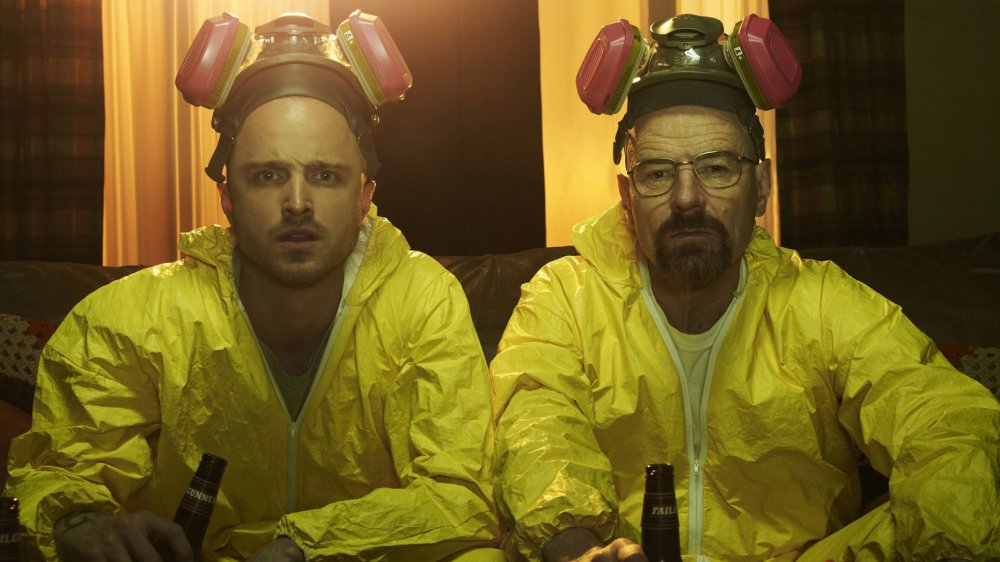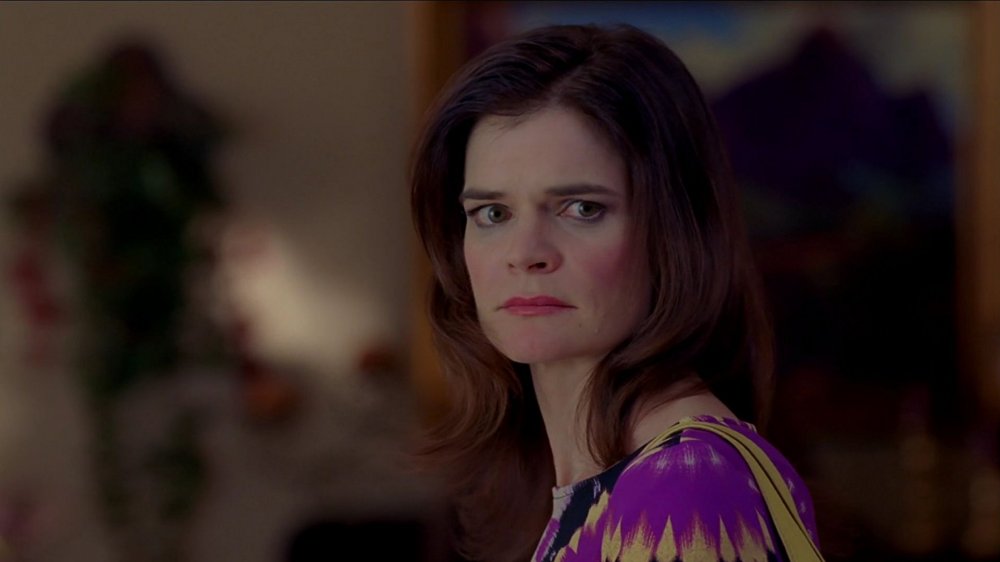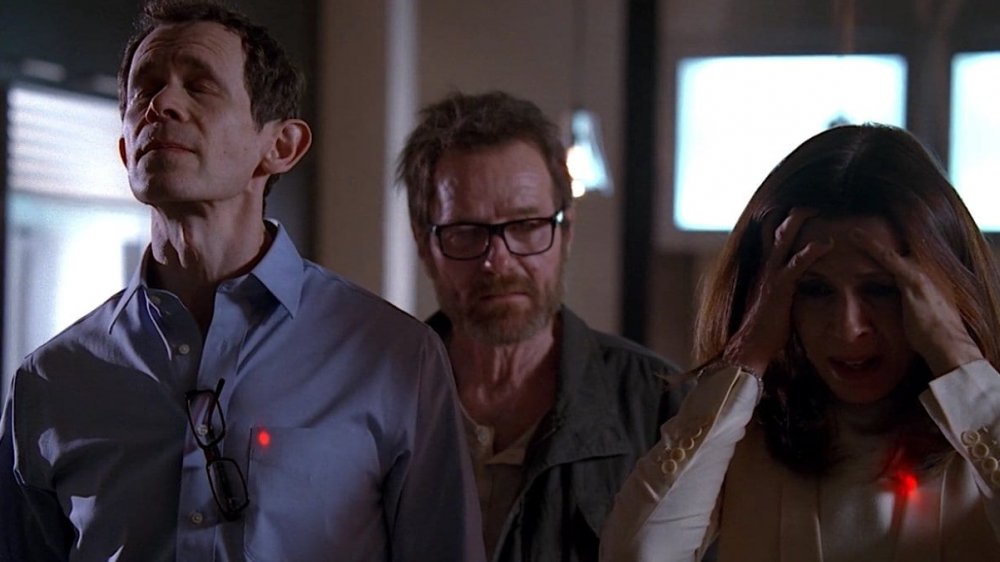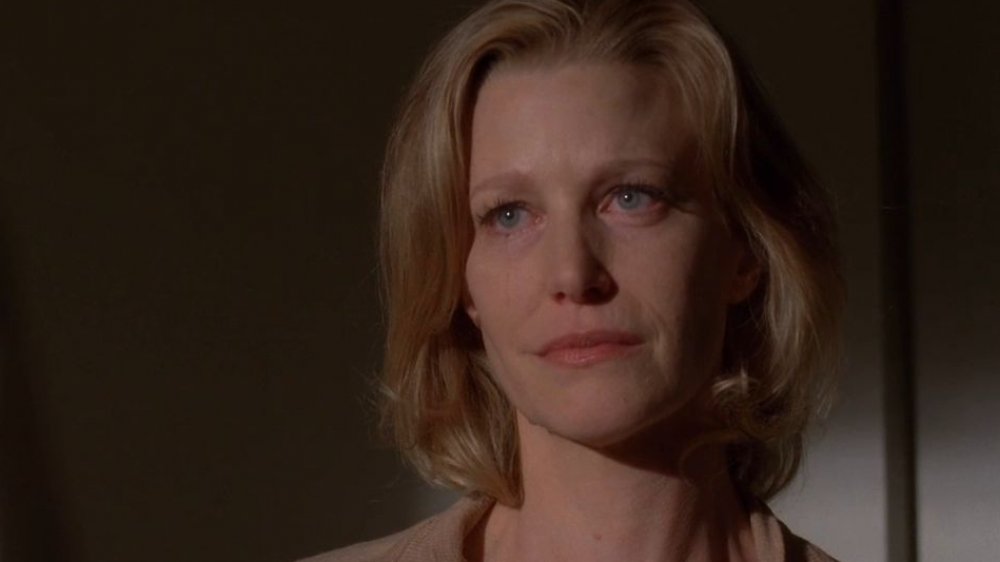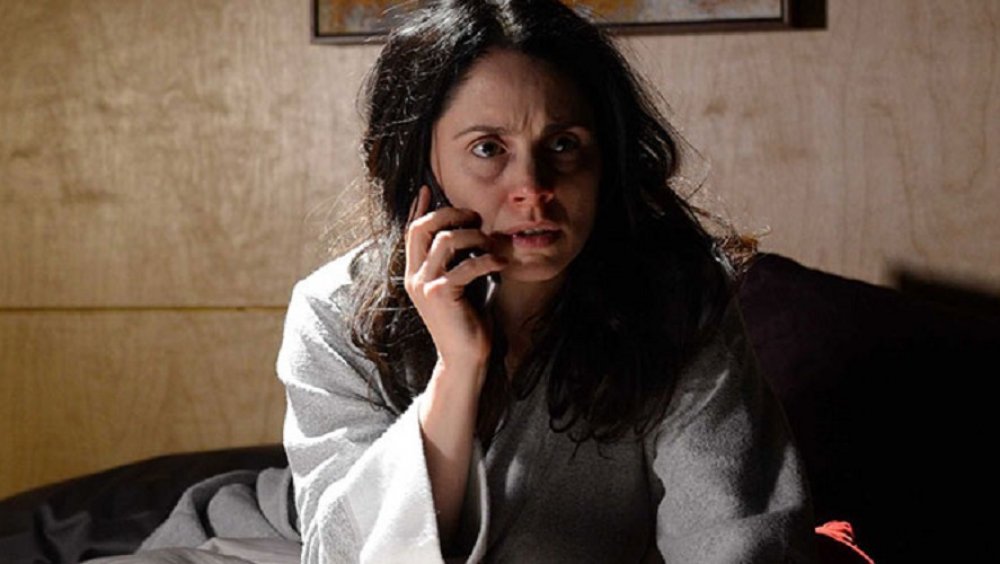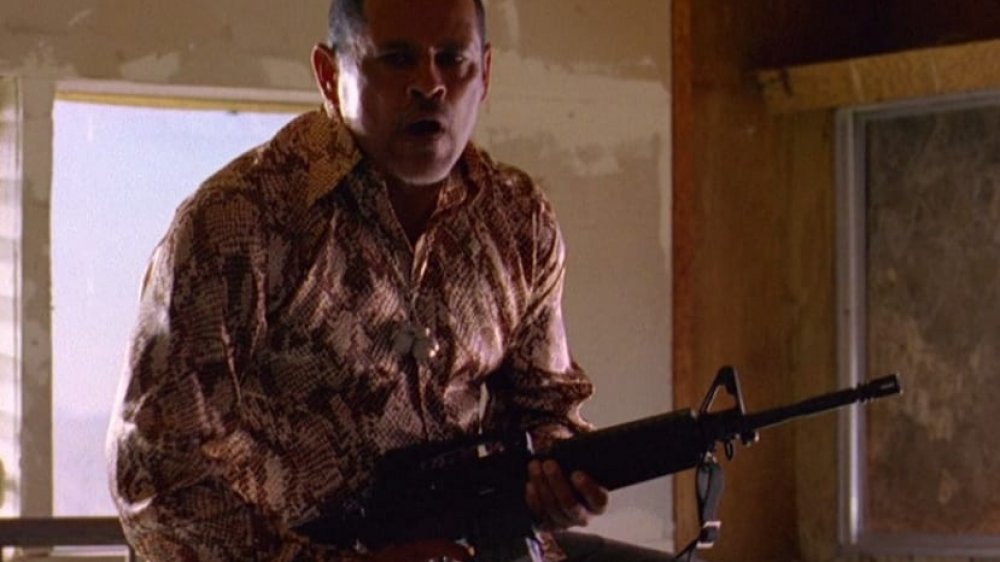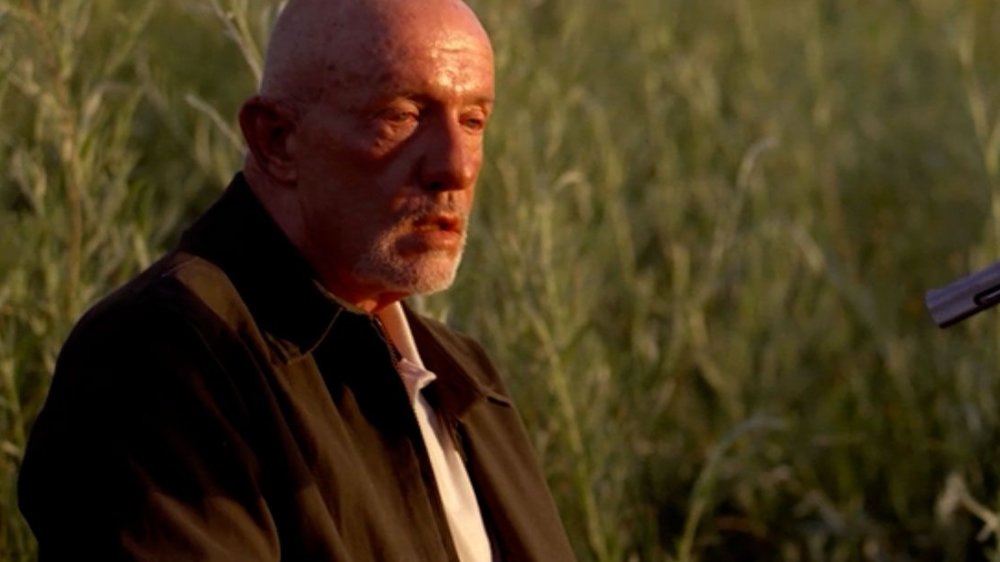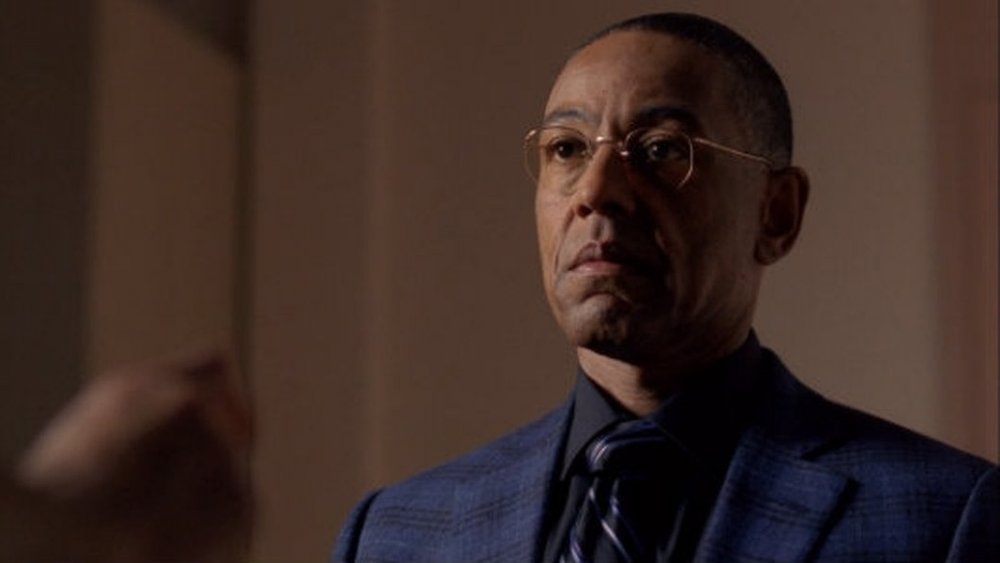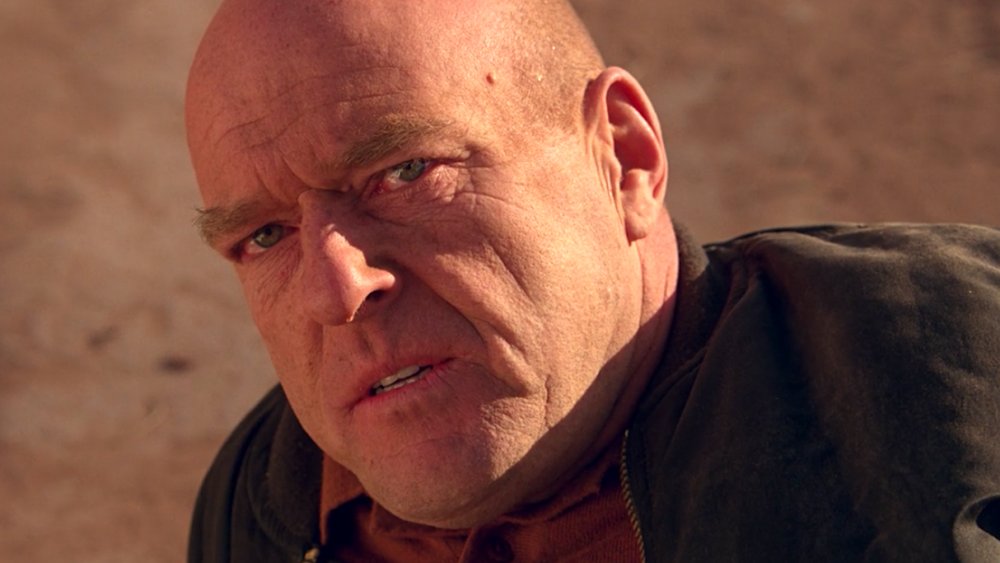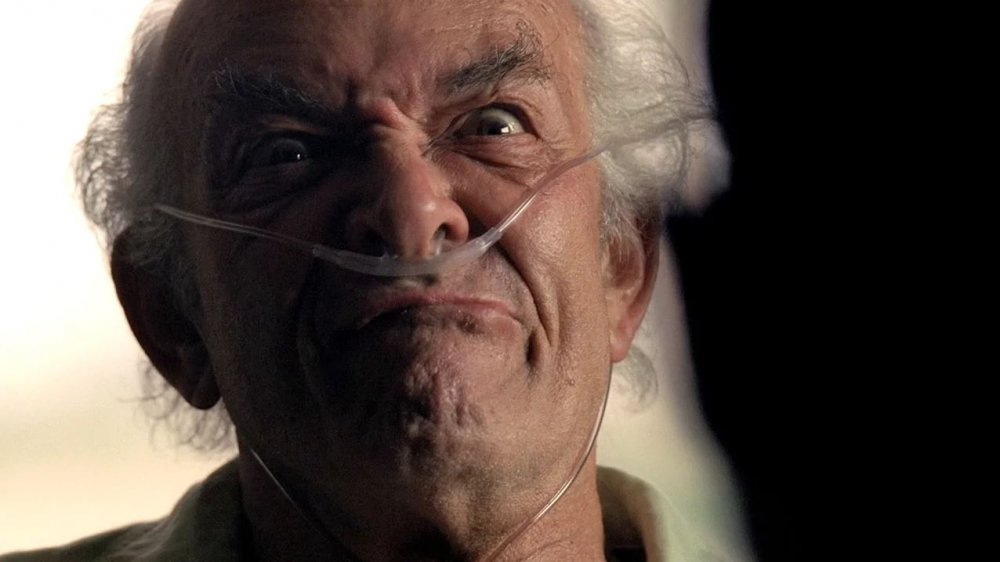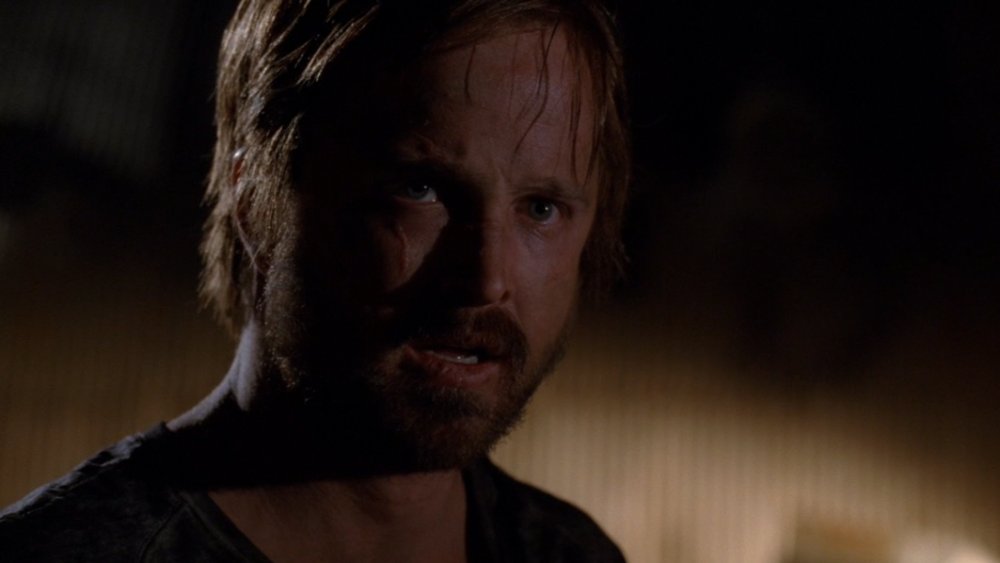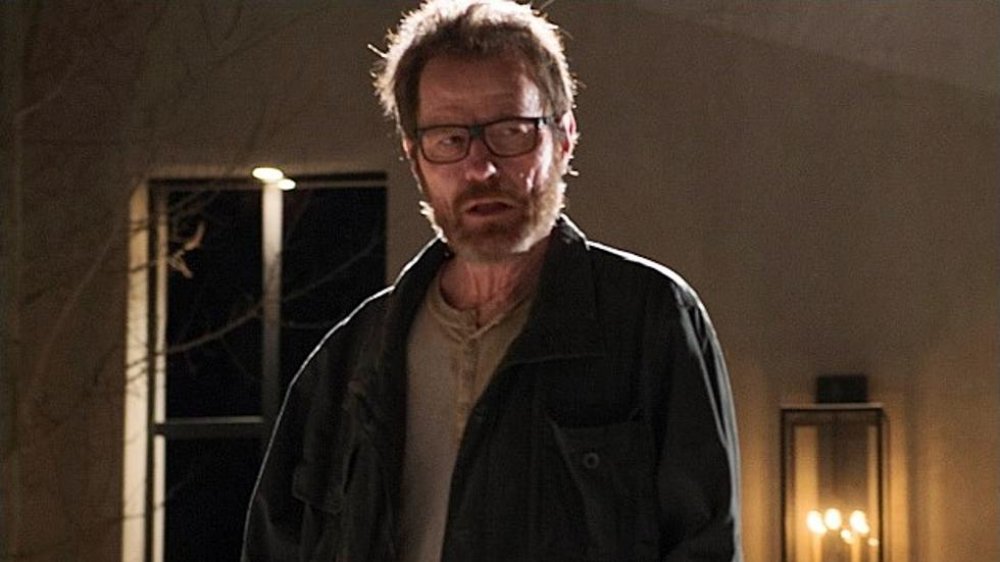Breaking Bad Character Endings Ranked From Worst To Best
Over the course of five seasons (six if you're a pedant who refuses to lump seasons 5A and 5B together), Breaking Bad improved with time, didn't make a single narrative mistake, and arguably ended at its highest-ever point. In all fairness, Breaking Bad was too good a show to have produced any truly bad endings.
But each one of its many unforgettable characters was so well developed and felt so authentic that it could be jarring to be reminded by the end of their respective arcs that most of them were only there to support the story of the main character, Walter White. So, which endings best supported the theme of Walt's corruption from high school chemistry teacher/mild-mannered dad to ruthless murderer and drug lord? Which arcs and endings were the best representation of that character's own minor themes? Did any stories fall short, and if so, how? What worked about the others?
From Gus Fring and Mike Ehrmantraut to Jesse Pinkman and Heisenberg himself, we've taken the liberty of compiling a list of the major Breaking Bad character endings from worst to best (not including everyone's favorite unscrupulous defense attorney Saul Goodman, whose story is ongoing). Warning — SPOILERS AHEAD.
Marie Schrader lost everything
Marie didn't have any easy time of it on Breaking Bad. She nearly lost Hank to cartel terrorists during his brief stay in El Paso. Then, she almost lost him to the Salamanca twins, who were sicced on Hank because Walt — their original revenge target for the death of their cousin, Tuco — was valuable to Gus. Cue weeks of agonizing heartache and fear for Marie as Hank teetered on the brink of paralysis and death. Then, she had to put up with downright cruel and abusive behavior from the man during his recovery. His wounded pride needed something to lash out against, and she was there. Hank's spirits only lifted when he smelled blood in the water of the blue meth case. But that breakthrough only led down an dark, ugly road.
In the end, she learned of her brother-in-law's criminal activities and, by extension, the betrayal by her sister, who went along with it all. Walt getting his long overdue comeuppance would've at least provided some reprieve from that pain, but moments after getting a call from Hank regarding Walt's arrest, her husband was shot and killed. At the end of the show, she was a childless widow who was never respected and whose feelings were rarely taken into consideration. Marie was nobody's favorite character. She may have been shrill, somewhat obnoxious, and an on-again, off-again kleptomaniac, but it's hard to make the case that she deserved any of this.
Gretchen and Elliott Schwartz became Walter's pawns
Walt may have started cooking meth for his family, but what really kept him going once he got started was a bottomless reservoir of envy and resentment. He was above all this, wasn't he? His mediocre job, his mediocre life, his joyless existence. Oh, and his old business partners, Gretchen and Elliott Schwartz. The three had built Gray Matter Technologies together back in the day, but after he left in the company's infancy, those two stuck around and got rich. Walt spent years watching the company's value climb while he nursed a wounded ego at a dead-end job that was beneath his undeniable brilliance. Even before his bitterness and hatred consumed him along with his cancer, he was only able to force a smile through gritted teeth when he interacted with them.
In the end, Walt used Badger and Skinny Pete — pretending to be hit men with the help of a pair of laser pointers — to scare Gretchen and Elliott into funneling the rest of his drug money towards his children, since the feds would seize it if they thought it was from him. Given their collective brilliance, it's a bit of a stretch to assume they'd go along with this plan once he left their mansion. It's also a stretch to assume Walt Jr., or anyone else, would accept such an out-of-nowhere cash infusion without question. Someone at some point would likely deduce that the money had come from a certain former meth kingpin.
Skyler White and Walter Jr. had their lives torn apart
Perhaps above all else, Walter White was a man in search of control. But the more he tried to exert control over the world and people around him, the more of it he lost. Walter Jr., his cerebral palsy-stricken son, may not have known much was up until the end of the show (other than that his parents' marriage was on the rocks and that Uncle Hank was after some unrelated meth cook named "Heisenberg"), but Skyler was suspicious almost from the beginning. Walt was always out late with increasingly mysterious alibis that collapsed under even moderate amounts of scrutiny. When she cornered him with divorce papers, his massive fortune wasn't enough to buy her forgiveness.
And yet, she couldn't bring herself to pull the trigger. Doing so would devastate her family, she reasoned, and besides, it was only a matter of time before Walt's cancer came back and, ahem, resolved the situation for her. Skyler stared into the abyss, and she blinked first. And what happens when you play chicken with monsters or the dark side of your own soul? You're either finished off or become twisted yourself. It's a slow moral decline but a sudden collapse, and one for which she and Walt Jr. paid dearly. Skyler did eventually snap out of her criminal trance, but not before she'd aided and abetted her monster husband for far too long. All things considered, she and her kids' meager, hunkered-down lifestyle after Walt left was an undeserved mercy.
Jack, Lydia, and Todd met their fates at the end of Breaking Bad
Walt's humble origins and inexperience as a criminal was actually a gift in certain circumstances, in that it led to his being constantly underestimated. People exploited his genius for profit, but they never grasped how dangerous he could be if he turned against them. Like certain other characters on this show, all three of these relatively minor antagonists made the fatal mistake of crossing Walt.
Lydia Rodarte-Quayle, an executive for Madrigal Electromotive (which secretly facilitated the international trade of blue meth), tried to toss Walt aside after he became difficult to work with. Later on, when he came back feigning financial desperation and begging for help, she tried to set up him up for an ambush. He beat her to the punch by poisoning her tea.
Jack Welker was the man Walt turned to when Jesse was after him, but his uneasy deal with this neo-Nazi devil resulted in the deaths of Hank and Steve Gomez, and it cost Walt the majority of his fortune. Walt paid him back with a belt of bullets, courtesy of an M60.
Todd Alquist, Jack's nephew, was perhaps the most chillingly sociopathic villain on the show. Gus was cold, too, but he was at least self-aware. Something about how casually Todd could kill innocent women and children and flash you a boyish grin right afterwards sent shivers up your spine. When Jesse strangled him with handcuffs in "Felina," it was perhaps the most satisfying scene of the series, but it was a miserable moment for the psycho. Well, good riddance to bad rubbish.
Tuco Salamanca ended Breaking Bad as a raging psycho
Tuco was arguably the first villain who could honestly be described as a kingpin. And because he was dumb enough to get high on his own meth supply, he was also one of the most terrifyingly impulsive and shockingly violent characters on the entire show, if not the most. Whether he liked or despised you was up to a coin flip. If he liked you, you could expect to be roped into business with him whether you liked it or not. If he didn't like you, well, let's just say you should've had a will written before you met. (The punches won't stop until your skull is pulverized.)
Tuco eventually kidnapped Walt and Jesse and dragged them to the desert, where he awaited his cartel connections to whisk them all away to Mexico. There, he hoped, he and his hostages would be beyond the reach of US law enforcement. Fortunately for Walt and Jesse, impulsive mistakes gave them a short window to turn the tables on and wound Tuco. Moments later, Hank, searching for the missing Walt, arrived and shot Tuco dead. This sent shockwaves throughout the cartel, which nearly got revenge. It also forced Walt to manufacture a "fugue state" mental episode, which he blamed on his cancer treatment, to explain his strange absence. Skyler, rightfully so, was suspicious. Could Walt and Jesse have avoided the Tuco fiasco? Perhaps. But hindsight is unhelpful when you're trapped in a desert rancher with a monstrous psychopath.
Mike Ehrmantraut majorly underestimated Heisenberg
Walt believed he was breaking the law to provide for his family, when it was clearly to soothe his wounded ego. Jesse believed he could make things right with reckless displays of charity and a lot of crying. Mike harbored no such illusions. He was a man largely at peace with the decisions he'd made, even if he regretted a few. He was too old, too out of patience, too tired of it all to waste time and energy convincing himself that killing people for drug dealers was somehow a noble calling. He was a crook with mouths to feed. So be it. It was exactly this cold, ruthless demeanor that made Mike so effective at his job. Generally speaking, his unwillingness to let emotion cloud his judgement kept him alive far longer than other players in the game. But there was a weakness.
Mike had previously described Walt as a ticking time bomb, and he'd had nothing but trouble working with him. He knew Walt was impulsive and arrogant. He also knew he was extremely dangerous (the man had killed Gus Fring, after all, and managed to escape when Mike zip-tied him to a door). And yet, Mike just couldn't take this dorky, dying, wannabe badass seriously. The two got into a vicious shouting match that ended with Walt stealing Mike's gun and shooting him with it. After all that Mike had been through and after all the foes he'd vanquished, it was Walt that bested him. For such a mighty figure, it was a humbling, horrible fall.
Gus Fring only had one weakness ... and it got him killed
Restaurateur/global meth kingpin Gustavo Fring was, for roughly half the show, a nearly insurmountable threat. He was Walt 2.0 — more experienced, more in control, and just as brilliant as his new cook, if not more so. He was also well-funded, always watching, far less impulsive, and always two steps ahead. Once it was clear their relationship was unsustainable, Walt tried everything to get at him. Ricin cigarettes. A gun. A car bomb. Saul and Mike and Jesse. None of those approaches worked because they weren't weaknesses for Gus. By the end of season four, a desperate Walt had overplayed his hand one too many times. Gus remained at large and dangerous ... and fully aware that Walter must be dealt with.
But even Gus wasn't invincible. He was famously cold and emotionless in nearly all of his affairs, but he had a small chink in his armor — a hatred for Hector, patriarch of the Salamancas, whose Juárez cartel had wronged him years ago. It was Jesse who observed Gus tormenting the wheelchair-bound Hector in a nursing home, and it was Walt who twisted this little nugget of knowledge into the centerpiece of a deranged Hail Mary that finally dethroned the once-mighty Fring.
Gus, famously cerebral and well-prepared, had miscalculated twice. The second and final time was when he took Hector's bait. The first was getting into bed with Walter White to begin with. It was a lesson many poor souls would learn, always too late.
Hank Schrader died a hero
Behind all his bluster and bravado, Hank Schrader was a man scared to death of his own fear. His oftentimes unhealthy obsession with his work nearly cost him his job and/or his life on multiple occasions, and so much of his identity was wrapped up in what he did that any failure sent him reeling into depression. Who was he if he wasn't on the hunt? Not a man at all. The thought of being inadequate and purposeless was what kept him up at night, far more than the street gangs and drug dealers he made a living going after.
The only cure was doubling down on the hunt. It was the resurfaced blue meth case that saved his wounded pride after he fled the horrors of El Paso. Later, he got back in the game again because of a stray hunch that Gus Fring, a mild-mannered restaurateur who frequented DEA wine and cheese affairs, might be running an industrial scale meth operation. Who would've thought? Not Hank's colleagues, but he proved them wrong.
He came tantalizingly close to being vindicated, too, when he finally slapped bracelets on his brother-in-law turned enemy, Walt. But then Jack Welker and his gang arrived and reminded us all, via gunshot, that this was never Hank's story. He was just another poor soul trapped in Walt's orbit of madness and despair. In the world of Breaking Bad, there are no happy endings, least of all for those who deserve them most, but at least Hank went out a hero.
Hector Salamanca got his revenge
We get a better handle on who Hector Salamanca is in Better Call Saul, the spin-off prequel to Breaking Bad. He was the patriarch of the Salamanca family and the monstrously effective drug lord who served as an enforcer for the Juárez cartel. As he ran most of the operations north of the US-Mexico border, he naturally had his fair share of run ins with all of our favorite characters.
In the events of Better Call Saul, Hector suffered a stroke that left him wheelchair-bound and unable to communicate, save for a now infamous bell at his right hand and a series of legendary snarls and grimaces. And during Breaking Bad, Hector spent much of his time at a nursing home, where he was semi-regularly visited by his various nephews and sons, all of whom were still involved with the cartel, and occasionally by his old nemesis Gustavo Fring, who liked to taunt and torment him.
In season four, Gus paid Hector a visit to inform him that his lineage and his legacy had been erased with the cartel's collapse. Gus left, content he'd bested his enemy for a final time. But then he was lured back and killed thanks to a suicidal ruse cooked up by Hector and bombmaker Walter White. Hector, with nothing left to live for, was happy to trade a few more degrading years in an old folk's home for a chance to blow Gus to hell with a bomb tucked beneath his seat.
We all hope Jesse Pinkman is okay
Jesse Pinkman was no saint. He made his living manufacturing and dealing meth. He shot Gale Boetticher in the face. He joined a support group for addicts because he knew they were a captive market one lousy afternoon away from a potentially lucrative relapse.
But we tend to sympathize with him anyway because he did feel remorse, at least tried to make things right (although, as Mike Ehrmantraut put it in the beginning of El Camino, "That's the one thing you can never do"), and suffered immensely over the course of the five-season series. His parents rejected him as a hopeless junkie. He lost his friend, Combo, and his lover, Jane, almost back to back — both to events that he had a part in (ordering Combo to deal drugs in hostile territory and shooting up with Jane, respectively). He was beaten halfway to death's door so many times it was a wonder he could stand upright by the end of the show. Then he nearly watched his girlfriend's son die of poisoning, was constantly manipulated by Walt, was enslaved and tortured by neo-Nazis, and then watched his aforementioned girlfriend, Andrea, get shot dead by one of them as punishment for a failed escape attempt.
After Walt busted him out in "Felina," and he managed to get out of Dodge in El Camino, you couldn't help but feel like the poor guy had earned something of a happy ending. We can only hope Alaska suited him better than Albuquerque.
Walter White ended Breaking Bad on his own terms
A botched ending to Walt's storyline would've shipwrecked the show, regardless of how everyone else's arcs concluded or how good Breaking Bad was leading up to its final moments. After all, the whole story was about his corruption from a mild-mannered suburbanite dad to a wicked kingpin. Everyone and everything else was there to support the development of that theme.
But that left showrunner Vince Gilligan and his writers in an awkward position as their increasingly popular show thundered to its conclusion. They'd always thought the audience would sour on Walt as he grew ever more cruel and prideful and manipulative, but most didn't. They might've cringed at his ugly low points — of which there was no shortage — but it's hard to root against the protagonist.
So how could the writers end his story? Sympathetically? No. Rewarding Walter after everything he'd done would be insulting and unsatisfying. What about a crippling defeat? Well, that wouldn't quite work, either. Again, he was the main character.
What they pulled off instead was a high-wire act that threaded the needle between the two camps. They punished Walt for his sins, but they also allowed him to exact vengeance on his enemies and cheat cancer by catching one of his own bullets in the ribs. So, his pride and monstrous behavior cost him everything, but he went out, at least to some degree, on his own terms. It was altogether deeply satisfying, unpredictable, and true to the nature and the uncompromising vision of Breaking Bad.
